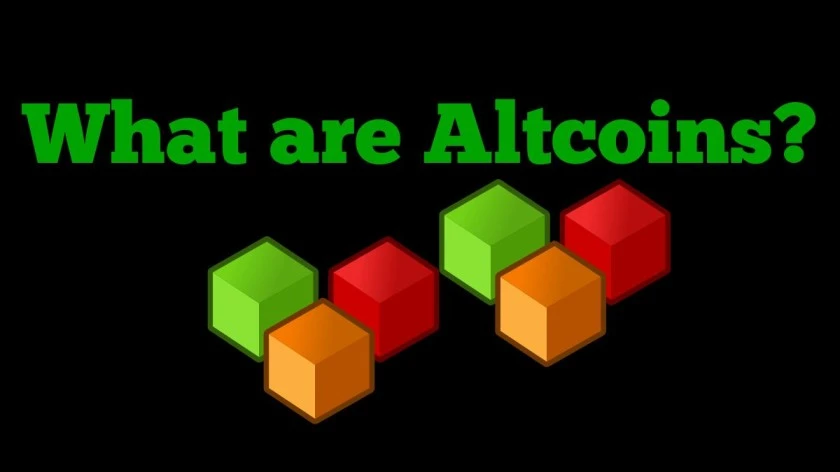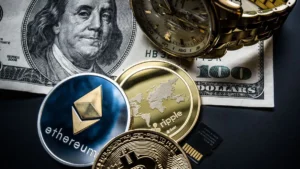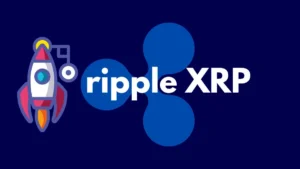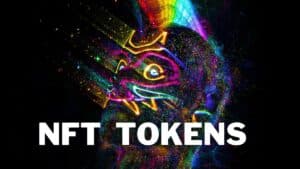Altcoins are a popular topic in cryptocurrency, but what are altcoins exactly? If you’re new to crypto, you may wonder what sets altcoins apart from Bitcoin and other cryptocurrencies.
Cryptocurrencies other than Bitcoin are known as “altcoins.” Any cryptocurrency other than Bitcoin is referred to as an “altcoin,” which is short for “alternative coin.” Among many others, Ethereum, Litecoin, Ripple, and Bitcoin Cash are a few well-known examples of alternative currencies.
Altcoins are cryptocurrencies that serve as alternatives to Bitcoin. Developers created them to provide different benefits, including quicker transaction speeds, lower fees, and improved security. Like Bitcoin, they rely on blockchain technology but implement distinct algorithms and consensus mechanisms.
Bitcoin was the first cryptocurrency, but now there are over 4,000 altcoins on the market. But altcoins have their unique features, advantages, and risks.
- History of Altcoins
- How Altcoins Differ from Bitcoin
- Types of Altcoins
- Altcoins Examples
- Pros and Cons of Investing in Altcoins
- Altcoins Mining
- Altcoin Exchanges
- Altcoin Regulation
- Altcoin Adoption
- Altcoin Wallets
- Altcoin Volatility
- Altcoin Trading Strategies
- Altcoin Scams
- Investing in Altcoins
- Frequently Asked Questions (FAQ)
- Conclusion
History of Altcoins
About two years after Bitcoin’s debut, in April 2011, Namecoin became the first alternative cryptocurrency. Its goal was to offer a decentralized name registration system that would let users register domain names without depending on a single entity.
Following Namecoin’s meteoric rise to fame, developers started to release a number of alternative coins with distinctive traits. As Bitcoin became slower and more expensive to use, Litecoin appeared as a quicker and more effective replacement in 2013. Litecoin sought to be more approachable to the typical user with a more user-friendly interface.
Since then, developers have launched many other altcoins, with new ones emerging regularly. Among the most notable and promising altcoins is Ethereum, which enables developers to create decentralized apps. On the other hand, Ripple offers quick and inexpensive cross-border payments.
How Altcoins Differ from Bitcoin
While altcoins share many similarities with Bitcoin, there are some key differences that set them apart. One of the most significant differences is the underlying technology used by each cryptocurrency.
Bitcoin uses a proof-of-work algorithm, which requires users to solve complex mathematical problems to verify transactions and add new blocks to the blockchain. This can be slow and energy-intensive, leading to high transaction fees and long wait times.
Many altcoins use alternative consensus algorithms, such as proof-of-stake, which are faster and more energy-efficient. This allows for faster transaction times and lower fees, making altcoins more attractive to users who want to make quick and cheap transactions.
Altcoins offer a wider range of uses compared to Bitcoin. It includes decentralized applications and smart contracts. This allows users to manage digital assets and execute complex financial transactions with cryptocurrencies.
Types of Altcoins
When it comes to cryptocurrencies, bitcoin is undoubtedly the most well-known and widely used. However, there are also a number of altcoins that offer their own unique features and use cases. Here are some of the most common types of altcoins:
Stablecoins
Stablecoins maintain a stable value and are typically pegged to a fiat currency like the US dollar. They are a type of cryptocurrency. The goal of stablecoins is to provide the benefits of cryptocurrencies, such as fast transaction times and low fees, without the volatility of traditional cryptocurrencies like bitcoin. Some popular stablecoins include Tether (USDT), USD Coin (USDC), and Binance USD (BUSD).
Utility Tokens
Altcoins called utility tokens are meant to be used within a specific platform or ecosystem. These tokens grant users access to a particular service or product and can frequently be exchanged for other cryptocurrencies or fiat currencies.
For example, Basic Attention Token (BAT) is used in the Brave browser, while Golem Network Token (GNT) is used on the Golem decentralized computing network.
Security Tokens
Security tokens are a type of altcoin that represents ownership in an asset, such as real estate, stocks, or bonds. These tokens are designed to be fully compliant with securities laws and regulations and are often subject to strict reporting and disclosure requirements. Security tokens can offer a number of benefits over traditional securities, such as increased liquidity, faster settlement times, and reduced fees.
Privacy Coins
Privacy coins are altcoins designed to provide users with increased privacy and anonymity. These coins use advanced encryption techniques to obscure transaction details and prevent tracking of user activity. Some popular privacy coins include Monero (XMR), Zcash (ZEC), and Dash (DASH).
Each type of altcoin offers its own unique advantages and disadvantages, so it’s important to research and understand the features of each one before investing. As with any investment, it’s also essential to exercise caution and never invest more than you can afford to lose.

Altcoins Examples
Litecoin (LTC)
Charlie Lee, a former Google engineer, launched Litecoin (LTC), a decentralized digital currency, in 2011. It operates on a blockchain network, similar to Bitcoin. However, Litecoin has some unique features that distinguish it from Bitcoin.
Unlike Bitcoin, Litecoin uses a different hashing algorithm called Scrypt. Charlie Lee designed it to resist the use of ASICs for mining, making it more accessible to individual miners using consumer-grade hardware. Another important feature of Litecoin is its faster block generation time of 2.5 minutes, which makes transactions faster and cheaper compared to Bitcoin.
Litecoin has gained a reputation as a reliable and stable cryptocurrency, often being referred to as the “silver to Bitcoin’s gold.” It has a strong community of developers and supporters who continue to improve its technology and expand its use cases.
Litecoin provides a quick and cost-effective means of transferring value between people, without the need for intermediaries such as banks or payment processors. Its unique features and growing adoption make it an interesting option for those interested in investing in the cryptocurrency market.
Ethereum (ETH)
Ethereum is a decentralized blockchain platform designed for developing and deploying decentralized applications, or dApps. Created by Vitalik Buterin in 2014, it has gained widespread popularity and usage.
Unlike Bitcoin, which functions primarily as a currency, Ethereum allows for the creation of decentralized applications without the need for a centralized intermediary. Smart contracts, self-executing agreements with terms directly written into lines of code, make this possible.
One of Ethereum’s notable features is its support for the creation of new cryptocurrencies and tokens. This has led to the development of numerous tokens, many of which are built on the Ethereum platform. These tokens serve various purposes, such as funding new projects or representing real-world asset ownership.
Ethereum’s support for decentralized autonomous organizations, or DAOs, is another notable feature. DAOs are organizations run by code instead of a central authority, enabling greater transparency and accountability.
In general, Ethereum is a versatile and potent platform that can revolutionize various industries such as finance, insurance, gaming, and social media. Its potential for innovation is impressive, and new use cases are continuously emerging as the ecosystem grows.
Ripple (XRP)
In 2012, Ripple Labs launched Ripple (XRP) as a digital currency and payment network. Its primary goal is to provide quick, secure, and cost-effective international money transfers. Unlike other cryptocurrencies, Ripple does not rely on a blockchain for its operation. Instead, it uses a distributed consensus ledger to process transactions.
One of the most significant advantages of Ripple is its ability to facilitate real-time cross-border payments. This feature has made Ripple a popular choice for banks and financial institutions seeking to improve their payment systems’ efficiency. Additionally, Ripple has low transaction fees, making it a viable option for individuals and businesses seeking a cost-effective payment solution.
Another unique aspect of Ripple is its gateways. These gateways serve as a link between Ripple’s network and other currencies like USD or EUR. This feature enables users to send and receive any currency on the network, making it a versatile platform for international transactions.
However, Ripple has faced some regulatory challenges. The U.S. Securities and Exchange Commission (SEC) sued Ripple in 2020 for allegedly offering unregistered securities. The lawsuit against Ripple is still in progress and may have a significant impact on Ripple and other cryptocurrencies.
Ripple provides an efficient and affordable option for international payments. It has the potential to be a valuable tool for both individuals and businesses that need to transfer money globally.
Yet, Ripple’s current regulatory challenges highlight the need for continued growth and the establishment of distinct legal guidelines for digital currencies.
Dogecoin (DOGE)
Dogecoin (DOGE) is a cryptocurrency that was launched in 2013 based on the internet meme, “Doge.” Despite its humorous beginnings, Dogecoin has gained a devoted following, including the support of well-known figures such as Elon Musk.
Like other cryptocurrencies, Dogecoin operates on a decentralized blockchain network. It is verified and processed through a network of nodes. However, it differs from other cryptocurrencies, such as Bitcoin or Litecoin, in that its supply is uncapped, meaning that an unlimited amount of DOGE can be created.
What makes Dogecoin unique is its strong and active community of supporters. They frequently engage in charitable acts, such as sponsoring sports teams or donating to charitable causes. This community-driven aspect of Dogecoin has helped it stand out in the cryptocurrency industry.
The media attention that Dogecoin has received has largely been due to the support of notable figures like Elon Musk, who has frequently tweeted about the cryptocurrency. Despite its popularity, some critics have raised concerns about Dogecoin’s long-term viability as a cryptocurrency. Its uncapped supply and lack of a clear development roadmap may pose challenges to its adoption and stability over time.
Dogecoin is a cryptocurrency that has become popular for its fun and friendly atmosphere and active community of followers. While some have concerns about its long-term sustainability, it continues to be a topic of interest and speculation for those involved in the world of cryptocurrency.
Pros and Cons of Investing in Altcoins
Altcoins offer several advantages over traditional currencies. Firstly, they are decentralized, meaning that no central authority controls them, leading to greater transparency and security. Additionally, altcoins are accessible to anyone with an internet connection, and they are not subject to the same regulations as traditional currencies, providing greater flexibility.
Furthermore, altcoins offer a level of anonymity as transactions occur through public and private keys, rather than personal information. They also typically have lower transaction fees than traditional currencies, making them more cost-effective for international transactions. Additionally, altcoins often have faster transaction speeds, making them more suitable for everyday use.
However, altcoins also present certain risks. One of the biggest risks is their high volatility, which can make them a risky investment. Altcoins are also not regulated in the same way as traditional currencies, leaving them more vulnerable to fraud and scams. Additionally, their limited adoption as a means of payment limits their practicality.
Altcoins Mining
Altcoin mining involves creating new units of a cryptocurrency by solving complex mathematical equations using powerful computer hardware. While specialized hardware is now dominant in Bitcoin mining, many altcoins can still be mined using a standard computer. Altcoin mining can be a profitable venture for those with the necessary equipment and technical expertise. However, it can also be highly competitive and energy-intensive, with mining difficulty increases as more miners join the network.
Altcoin Exchanges
Altcoins can be bought and sold on a variety of cryptocurrency exchanges. These exchanges allow users to trade one type of cryptocurrency for another, as well as for fiat currencies like the US dollar or euro. Some popular altcoin exchanges include Binance, Coinbase Pro, and Kraken. When choosing an exchange, it is important to consider factors like trading fees, security measures, and available trading pairs.
Altcoin Regulation
Currently, many altcoins exist in a legal gray area, with the regulatory landscape for cryptocurrencies constantly evolving. Altcoin developers and investors must be aware of the regulatory environment in their local jurisdictions, as non-compliance can result in hefty fines or even legal action.
Altcoin Adoption
Altcoins have gained significant adoption in certain communities, with certain altcoins like Monero and Zcash being popular among users who prioritize privacy and anonymity. However, widespread adoption of altcoins will likely depend on factors like increased regulatory clarity, improved user experience, and a broader understanding of the benefits and risks of cryptocurrencies.
Altcoin Wallets
Altcoins, like other cryptocurrencies, are stored in digital wallets that come in different types. These include desktop wallets, mobile wallets, and hardware wallets. Desktop wallets are installed on a computer and offer more control over private keys, but they are less portable. On the other hand, mobile wallets are installed on a smartphone and provide greater convenience but may be less secure. Hardware wallets, which are physical devices, offer the highest level of security but may be more expensive.
When choosing a wallet, it is important to consider factors such as security, ease of use, and the specific altcoins that the wallet supports. This is because not all wallets support every type of altcoin, and some wallets may be more vulnerable to security breaches than others. By carefully considering these factors, altcoin holders can ensure that their assets are stored in a safe and accessible manner.
Altcoin Volatility
Altcoins, like all cryptocurrencies, has a reputation for high volatility, with prices prone to rapid fluctuations. While this can make altcoins appealing for those looking for big returns, it also means that they come with an increased level of risk.
Investors in altcoins should be aware of the potential for significant price swings and should take steps to manage risk, such as setting stop-loss orders or diversifying their investments across multiple altcoins. It is important to have a solid understanding of the market and to carefully research any altcoin before investing.
Altcoin Trading Strategies
Investors can employ different trading strategies to trade altcoins, depending on their investment goals and risk tolerance. Day trading involves buying and selling altcoins within a single day, while swing trading involves holding them for a few days to a few weeks.
On the other hand, long-term holding, or “HODLing,” entails buying and holding an altcoin for an extended period with the expectation of an increase in value over time. Each strategy has its own set of potential rewards and risks, and investors should carefully assess their investment goals and risk appetite before selecting a trading strategy.
Altcoin Scams
Just like any other emerging market, the altcoin space has had its fair share of scams and fraudulent projects. Investors must exercise caution and watch out for projects that offer unrealistic returns, lack transparency, or show little to no development activity.
Before investing in an altcoin, it is crucial to conduct thorough research and due diligence, such as reading the project’s whitepaper, reviewing community forums, and verifying the credentials of the development team.
Altcoins present various investment opportunities and use cases. But they also entail risks such as volatility and susceptibility to fraud. Investors must conduct extensive research and take necessary measures to manage risks. Developers must focus on creating transparent and sustainable projects that offer actual value to users.
Investing in Altcoins
Investing in altcoins can be a risky but potentially rewarding venture. Before investing in any altcoin, it is important to do your research and understand the potential risks and rewards. Here are some tips for investing in altcoins:
- Research the Altcoin
- Before investing in any altcoin, it is important to thoroughly research the project and the team behind it.
- Look for information such as the whitepaper, team members, and community support.
- You should also consider the potential use case and competition in the market.
- Consider Market Cap and Volume
- Market capitalization and trading volume can give you an idea of the altcoin’s liquidity and potential for growth.
- Higher market caps and trading volumes can mean that the altcoin is more widely adopted and has a larger potential market.
- Diversify Your Portfolio
- Diversification is important in any investment portfolio, including cryptocurrency.
- Investing in a variety of altcoins can help spread the risk and potentially increase rewards.
- Stay Up to Date on News and Trends
- The cryptocurrency market is constantly changing, and it is important to stay up to date on the latest news and trends.
- Joining communities and following key influencers can help keep you informed and up to date.
Frequently Asked Questions (FAQ)
What is the difference between Bitcoin and altcoins?
Bitcoin was the first cryptocurrency and remains the most popular. But altcoins are designed to provide specific functionalities and use cases that Bitcoin does not.
What are some of the risks of investing in altcoins?
Investing in altcoins comes with a number of risks, including high volatility, security issues, and the potential for scams and fraud. It’s important to carefully research any altcoin before investing and to only invest what you can afford to lose.
What are some of the benefits of using altcoins for transactions?
Altcoins can offer faster transaction times, lower fees, and greater privacy and security compared to traditional fiat currencies. Some altcoins also offer unique features like smart contracts and decentralized applications.
How do I choose which altcoins to invest in?
Choosing which altcoins to invest in can be a complex process. Some important factors to consider include the project’s team and track record, the technology behind the coin, and the coin’s market capitalization and trading volume.
How do I store and secure my altcoins?
Altcoins can be stored in a variety of ways, including in online wallets, hardware wallets, and paper wallets. It’s important to follow best practices for security, such as using strong passwords and two-factor authentication, and to keep your private keys safe and secure.
Can I use altcoins for everyday purchases?
While altcoins are still not widely accepted as a form of payment, there are a growing number of merchants and businesses that are beginning to accept them. Additionally, some altcoins offer debit cards or other solutions that make it easier to use them for everyday purchases.
Do governments regulate altcoins?
Regulations for altcoins vary by country and jurisdiction. In some countries, altcoins are subject to the same regulations as traditional financial instruments. But in others, they are subject to more limited or no regulation at all. It’s important to research the laws and regulations in your country before investing in or using altcoins.
Can I mine altcoins?
Many altcoins can be mined using specialized hardware or software. However, the mining process can be complex and requires significant resources, including energy and computing power. Additionally, not all altcoins are mineable, and some use different consensus algorithms or other methods for maintaining their blockchain.
Conclusion
Altcoins have expanded the cryptocurrency world, offering a variety of benefits for investors and users. These benefits include faster transactions, enhanced privacy and security, and more. As the altcoin market continues to grow, it’s important to keep up with the latest trends and do thorough research before investing to maximize returns. The world of altcoins is exciting and dynamic, with opportunities and challenges for all types of investors. So start exploring the possibilities of altcoins today and see how this innovative technology can benefit you.




